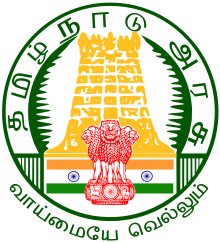Department of Backward Classes, Most Backward Classes and Minorities Welfare (Tamil Nadu)
 | |
| Agency overview | |
|---|---|
| Jurisdiction | Tamil Nadu |
| Headquarters | Chennai |
| Ministers responsible |
|
| Agency executive |
|
| Parent agency | Government of Tamil Nadu |
| Website | Backward Classes, Most Backward Classes and Minorities Welfare Department |
The Department of Backward Classes, Most Backward Classes and Minorities Welfare is one of the departments of Government of Tamil Nadu.
Objective[edit]
The department is responsible for the formulation and implementation of welfare schemes and reservation in education and jobs for backward and most backward classes, de-notified communities and minorities.[1]
Reservation[edit]
| Category | Reservation |
|---|---|
| Backward Class | 26.5% |
| Backward Class Muslim | 3.5% |
| Most Backward Class De-notified Community |
20% |
| Scheduled Caste | 18% |
| Scheduled Tribe | 1% |
| Total | 69% |
Reservation is a system that allows the government to set reserved quotas or seats, at particular percentage in education admissions, employments, promotions, etc. for socially and educationally backward communities.[3] The Mandal Commission report in 1980 on the situation of the socially and educationally backward classes led to the implementation of reservation policies in the 1990s.[4] The Supreme Court of India ruled in 1992 that reservations could not exceed 50 percent, however, Tamil Nadu has a 69 percent reservation, the highest in the country, through constitutional amendments and corresponding state laws.[5][2] The department is responsible for the facilitation and ensuring the implementation of reservation wherever applicable including higher education and government jobs.[1]
Welfare schemes[edit]
As a part of welfare of backward communities, the department is responsible for the distribution of benefits such as free uniforms, bicycles and scholarship to students.[2] It runs and maintains student hostels across the state for the respective community groups. The department is also responsible for implementing land distribution and construction of affordable housing through various welfare boards for the respective communities.[2]
Minority welfare[edit]
The minority welfare department is responsible for the welfare of both religious and linguistic minorities.[6] For the religious minorities, the department is responsible for implementation of welfare schemes, maintenance of hostels and religious sites, pilgrimage aid, aid for women empowerment and education among others.[6] The department also oversees the welfare, assistance and education of linguistic minorities who speak Telugu, Kannada, Malayalam, Marathi, Urdu and Saurashtra as their primary language.[6]
See also[edit]
References[edit]
- ^ a b "Backward Classes, Most Backward Classes and Minorities Welfare". Government of Tamil Nadu. Retrieved 1 December 2023.
- ^ a b c d Backward Classes, Most Backward Classes Policy 2023-24 (PDF) (Report). Government of Tamil Nadu. Retrieved 1 December 2023.
- ^ Rajagopal, Krishnadas (11 June 2020). "Right to reservation is not a fundamental right, observes SC judge as parties withdraw plea for quota". The Hindu. ISSN 0971-751X. Retrieved 1 December 2020.
- ^ Bhattacharya, Amit (8 April 2006). "Who are the OBCs?". The Times of India. Archived from the original on 27 June 2006. Retrieved 19 April 2006.
- ^ "Indra Sawhney Etc. vs Union of India And Others, Etc. on 16 November, 1992". Indian Kanoon. Retrieved 22 August 2012.
Even though the Constitution does not lay down any specific bar but the constitutional philosophy being against proportional equality the principle of balancing equality ordains reservation, of any manner, not to exceed 50%.
- ^ a b c Minorities welfare Policy 2023-24 (PDF) (Report). Government of Tamil Nadu. Retrieved 1 December 2023.
